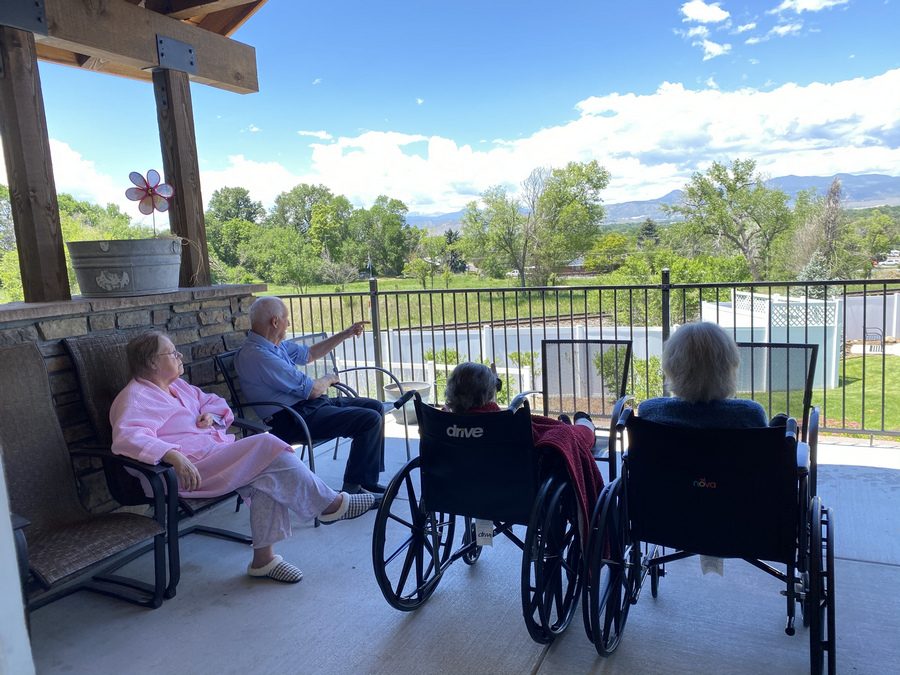Boutique Memory Care Communities That Feel Like Home
All Concerning Memory Treatment Services: Why Small Memory Treatment Homes Are a Terrific Choice
Memory treatment solutions play a vital role in sustaining people with Alzheimer's and mental deterioration. Little memory treatment homes stand out for their individualized method and intimate setup. With reduced staff-to-resident proportions, these homes foster stronger links and customized care. Homeowners benefit from enhanced social interactions and a risk-free atmosphere. As families check out alternatives, understanding the unique benefits of little memory care homes becomes crucial. What factors should be thought about when choosing the best home?
Comprehending Memory Treatment Provider
While lots of may recognize with basic senior care alternatives, understanding memory treatment services is essential for families facing the challenges of cognitive decrease. Memory care specifically accommodates individuals with conditions such as Alzheimer's illness and other forms of dementia. These services offer an organized setting that concentrates on improving the lifestyle for locals via specialized care and support.Memory treatment centers are created to ensure safety and security and safety, commonly featuring secured atmospheres to avoid roaming. Educated team participants are readily available all the time to help with day-to-day activities, drug administration, and individual care. Additionally, memory treatment programs commonly include cognitive stimulation activities, tailored to involve citizens and promote mental well-being. Family members can take advantage of understanding these solutions, as they enable informed choices concerning their enjoyed ones' care, ensuring that their specific requirements and preferences are resolved in a caring and encouraging way.
The Advantages of Small Memory Care Residences
Small memory treatment homes supply unique advantages that can considerably boost the high quality of life for locals with cognitive disabilities. One substantial benefit is the intimate setting, which enables individualized communications amongst team and residents. This smaller sized setup promotes significant relationships, lowering feelings of seclusion and anxiety often experienced by individuals with memory issues.Additionally, the lower staff-to-resident ratio in little memory care homes makes it possible for caretakers to provide even more conscientious guidance and assistance. This approach not just improves safety however likewise advertises a complacency for the residents.Moreover, tiny memory care homes can adapt rapidly to the unique requirements and preferences of each local, permitting for an extra homey ambience. Such a setting can encourage social interaction and involvement in activities, inevitably improving the daily experiences of those coping with cognitive impairments.
Personalized Treatment Plans for Homeowners
Personalized care strategies are essential in memory treatment homes, as they accommodate the one-of-a-kind demands and preferences of each citizen. These strategies start with thorough analyses performed by skilled specialists, that assess cognitive capabilities, clinical history, and individual rate of interests. This customized strategy warranties that care is not just efficient but additionally considerate of each individual's self-respect and autonomy.Moreover, customized treatment strategies are versatile, enabling adjustments as homeowners' requirements progress gradually. This flexibility promotes a complacency and knowledge, which is necessary for individuals coping with memory obstacles. Caregivers are educated to execute these strategies constantly, offering assistance that lines up with the residents' regimens and preferences.Ultimately, customized treatment strategies boost the lifestyle for citizens by advertising engagement, well-being, and independence, making them an essential facet of memory care solutions in little memory treatment homes.
Developing a Home-Like Setting
Creating a home-like atmosphere is vital for fostering convenience and knowledge in memory care settings, as it considerably affects homeowners' psychological health. Tiny memory treatment homes typically prioritize personalized touches, such as cozy shade schemes, family pictures, and familiar furnishings plans, which help residents really feel more comfortable. Integrating aspects similar to a standard home, like relaxing living rooms and public areas, motivates a feeling of belonging.Moreover, utilizing all-natural light and exterior areas can boost the atmosphere, promoting relaxation and tranquility. Employee play a considerable duty in maintaining this setting by involving with homeowners in a compassionate manner, treating them like family members. Routine tasks, such as cooking or horticulture, can likewise add to a home-like feel, using opportunities for homeowners to join meaningful experiences. Generally, developing a nurturing setting sustains cognitive feature and emotional security, making it an essential aspect of memory treatment solutions.
Improved Social Communication and Neighborhood
Boosted social communication and community are important parts of memory care services. By promoting customized social interaction and producing a family-like atmosphere, these services advertise significant links among homeowners. Team activities and events further encourage engagement, aiding people feel much more included and supported.
Individualized Social Interaction
While social communication is crucial for general well-being, several individuals with memory impairments typically battle to involve meaningfully with others. Personalized social engagement in memory treatment homes addresses this difficulty by developing customized activities that deal with locals' special interests and abilities. By concentrating on specific preferences, caretakers great site can cultivate connections that resonate deeply with each person. Activities such as art treatment, songs sessions, and guided conversations promote cognitive excitement and psychological expression. In addition, small group setups motivate sociability and permit more intimate interactions, boosting sensations of belonging. This technique not just combats feelings of seclusion however likewise empowers citizens to maintain a sense of identity, ultimately contributing to boosted mental health and wellness and top quality of life.
Family-like Ambience
In a memory care setup, cultivating a family-like environment considerably enhances social interaction and develops a sense of neighborhood among residents. Smaller sized memory treatment homes commonly prioritize intimate atmospheres, permitting homeowners to form closer connections with one an additional and team member. This nurturing atmosphere promotes count on, which is essential for people with memory problems. Homeowners are most likely to involve in conversations and share experiences, developing a supportive network that eases feelings of isolation. The experience of shared rooms and regimens contributes to a sense of belonging, even more urging social communication (personalized memory care). In such setups, emotional bonds flourish, causing enhanced general health and a better of life for residents as they browse their day-to-day experiences with each other
Team Activities and Occasions

Safety and Safety Features in Tiny Houses
Many tiny homes developed for memory care include necessary safety and security and security features to guarantee the wellness of locals. These homes typically utilize safe and secure entry and departure indicate stop wandering, an usual concern amongst people with memory impairments. Furthermore, security systems and alarm mechanisms boost tracking, guaranteeing that personnel can immediately react to any kind of unusual activities.Interior formats are tailored for safety, with reduced risks such as clutter-free pathways and sharp edges. Handrails and non-slip floor covering are commonly set up to decrease the risk of falls. Employee are educated in emergency situation procedures, guaranteeing they are gotten ready for numerous situations.Moreover, customized treatment plans might include assessment of specific safety and security needs, supplying tailored remedies for each and every homeowner. On the whole, these security and protection features produce a nurturing setting where residents can thrive while preserving their dignity and freedom.
How to Pick the Right Memory Treatment Home
How can family members guarantee they select the most appropriate memory treatment home for their loved ones? The decision needs cautious consideration of numerous elements. Family members need to review the center's staff qualifications and training, guaranteeing that caregivers are experienced in handling try this website memory-related problems. Next off, it's important to evaluate the home's atmosphere, concentrating on safety functions and whether it cultivates a sense of community and belonging. Visiting the facility can give understanding into daily tasks and the social ambience, which are vital for mental stimulation and psychological wellness. Additionally, families need to ask regarding the treatment strategies offered, ensuring they are customized to specific requirements. Considering the home's area and access for family visits can contribute to a smoother change. By attending to these facets, families can make an educated decision that prioritizes their liked one's comfort and top quality of life in a memory treatment setup.
Regularly Asked Concerns
What Credentials Should Personnel Members in Memory Care Houses Have?
Employee in memory care homes need to have relevant accreditations, experience in dementia care, solid communication skills, and concern. Continuous training in behavioral monitoring and therapeutic interventions boosts their capability to sustain citizens properly.
How Do Memory Care Services Differ From Standard Assisted Living?
Memory treatment services concentrate especially on individuals with memory disabilities, offering customized support and organized environments. In contrast, standard assisted living supplies general assistance with daily tasks, lacking the customized approach needed for those with cognitive challenges.
What Kinds of Tasks Are Provided in Memory Care Houses?
Memory treatment homes usually use a selection of activities made to involve citizens. Typical alternatives consist of art therapy, music sessions, cognitive games, physical exercises, horticulture, and get-togethers, all focused on boosting wellness and cognitive feature.
Can Residents Bring Their Own Possessions to Memory Care Houses?
Citizens can generally bring their very own valuables to memory treatment homes, permitting them to individualize their space - personalized memory care. This technique assists produce a familiar environment, promoting convenience and a feeling of identification for the individuals

Exactly How Are Household Participants Associated With the Treatment Refine?
Household members play an essential role in the care process, typically joining decision-making, attending treatment conferences, and providing emotional assistance. Their involvement fosters a collaborative find out this here environment, enhancing the local's general health and high quality of life. While many might be familiar with basic senior treatment options, understanding memory care solutions is essential for family members dealing with the obstacles of cognitive decrease. These solutions provide a structured atmosphere that concentrates on boosting the quality of life for homeowners with specialized treatment and support.Memory treatment centers are made to guarantee safety and security and safety, usually featuring protected settings to stop wandering. Customized care plans are vital in memory treatment homes, as they provide to the distinct needs and preferences of each citizen. Staff members in memory care homes should possess pertinent accreditations, experience in mental deterioration care, strong interaction abilities, and compassion. Memory care services concentrate particularly on people with memory impairments, providing specific support and organized environments.